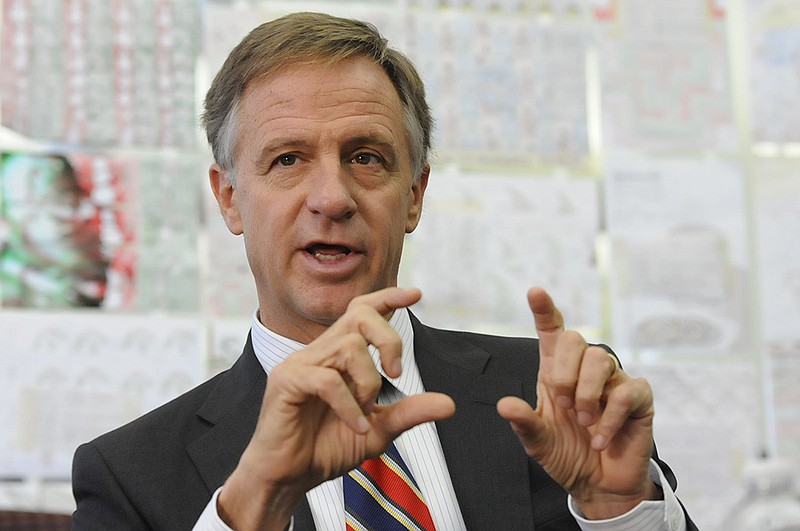Read more
Tennessee Gov. Haslam has one eye on Medicaid’s future
NASHVILLE -- As he begins a campaign to sell his Insure Tennessee plan to fellow Republicans in the state Legislature, Gov. Bill Haslam says providing lower-income residents with federally subsidized health care coverage is "both morally and fiscally the right thing to do."
But the governor readily acknowledges some party compatriots will resist his proposal for the two-year pilot project he says breaks new ground in Medicaid programs. It seeks to use federal Medicaid expansion dollars under the Affordable Care Act to extend health coverage to as many as 200,000 people, but Haslam says the plan carries a distinct Tennessee stamp.
"Every one of those folks has run sometime in the last four years saying, 'I think Obamacare is really bad,'" Haslam told Times Free Press editors and reporters on Tuesday, a day after unveiling the verbal agreement he won from the Obama administration after nearly two years of negotiation.
"What we have to be able to do is to say, 'Here's why this is not Obamacare and here's why this is a true market-based incentive plan that we think is the right thing to do.'"
The governor said he believes his proposed two-year waiver meets that test. His administration says it's a workable alternative to President Barack Obama's version of expanding the Medicaid program for the poor.
One part of Haslam's two-track plan would offer vouchers to adults earning up to 138 percent of the federal poverty level, about $16,100 for a single person, to help pay for employer-sponsored coverage, includes co-payments and promotes "personal responsibility," such as quitting smoking.
The other track would work more like traditional TennCare, but would include co-pays for all and premiums for people earning more than $11,670 a year or $19,790 for a family of three.
Republican Senate Speaker Ron Ramsey said the plan is an "opportunity that must be taken seriously," given that it's an "opportunity to take power away from the federal government."
Haslam, Ramsey added, "has negotiated a deal which returns tax dollars back to Tennessee while using conservative principles to bring health insurance to more Tennesseans."
House Majority Leader Gerald McCormick, R-Chattanooga, sees "some good things" in the proposal.
"You know we [Republicans] all along ... have said, give us some tools to work with to control costs and add some free market elements to Medicaid and we'd love to run with it.
"Now it seems like the federal government is actually letting us do that," McCormick said. "And that's a positive. They're letting us promote personal responsibility."
Federal dollars will pay the full share of the expansion through 2016 and 90 thereafter, when the state would have to begin putting in money.
But McCormick said the Tennessee Hospital Association, most of whose members already pay a 4.5 percent assessment on net profits to help fund TennCare, has agreed to up the ante for the expansion.
Last year the General Assembly passed a law giving itself approval power over any move to expand TennCare.
"On the face of it, it sounds like something I can support," McCormick said. "The one big question mark is what are the details? We don't have an actual copy of the proposed legislation and we don't have a copy of the actual proposal."
Haslam said his administration is drafting a proposed waiver of federal Medicaid rules that would need to be approved by the U.S. Department of Health and Human Services. He expects to present legislation in a special session either in late January or early February, Haslam said.
He's said he believes all 26 House Democrats and five Senate Democrats support the plan.
But some Republicans remain opposed. The Wall Street Journal quoted one of the most vocal critics of expansion, Sen. Brian Kelsey, R-Germantown, as saying he will fight the governor's proposal.
"Tennesseans elected Republicans to shrink government, not expand it--and certainly not to expand it for Obamacare," Kelsey said.
The Nashville-based Beacon Center, a libertarian-style think tank and advocacy group, and the Tennessee chapter of Americans for Prosperity, which receives at least some of its funding from the conservative billionaire brothers Charles and David Koch, have denounced the plan as well.
Andrew Ogles, state director for AFP, said the group is "disappointed" in Haslam and that other states with "hybrid plans" similar to Haslam's "have proven to be little more than expansion by another name, and our volunteers plan on engaging aggressively, as that is likely to be the case here in Tennessee."
Expanding Medicaid "would double down on a bloated program that's already failing patients across the country, and unreliable federal funding could put Tennesseans on the hook for billions of dollars," resulting in higher taxes, Ogles said.
So far, 27 states have agreed to expand Medicaid, including eight led by Republicans. And Republican governors in Wyoming and Utah are pushing alternative plans as well. Alabama news organizations reported last week that Republican Gov. Robert Bentley is saying he would entertain a federal block grant.
Haslam told the Times Free Press on Tuesday that Republican governors go to Washington every year and ask presidents for Medicaid block grants to free them of what they say are the program's cumbersome rules.
The Republicans say, "If you'll just block grant that money to us and let us run the program we can run it better," Haslam said. "And they always say no, no way we're going to do that."
"The point I would make to the Legislature is if they did block grant us and we designed our program, it would look a lot like what we're talking about here," Haslam added. "We feel like we squeezed everything out of Health and Human Services that we could."


